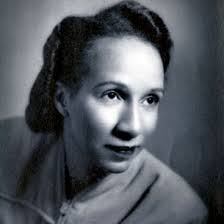|
In 1896 Lola Shirley Graham Dubois was born in Indianapolis, Indiana to Rev. David A. Graham and Elizabeth Etta Graham. As a young girl Dubois was taught the importance of opposing personal and social injustices within her community. She showed her brilliance as a 13 year old when she wrote an editorial for the Indianapolis newspaper protesting the discrimination she experienced. She was fueled to write the editorial because she was denied access to a public pool at her local YMCA. Early in her life Dubois and her family lived in five different cities before settling in Spokane, Washington. While living in Spokane Dubois graduated from Lewis and Clarke high school then moved to Seattle, Washington. While in Seattle she met and married her first husband Shadrach McCants. The couple had two sons before divorcing in 1927. By 1931 Dubois sought the help of her parents to help raise her children while she attended graduate school. She was able to earn her master’s degree in fine arts and music history at Oberlin College. Dubois also attended Columbia University, Howard University, and Morgan State University briefly before earning her master’s. In 1932 as a student at Oberlin College Dubois’ three-act, sixteen seen Opera, Tom-Toms: An Epic of Music and the Negro debuted at Cleveland Stadium drawing a crowd of ten thousand people. Her second showing of her opera drew a crowd of fifteen thousand people, one of which was the Governor of Ohio Newton Baker. Dubois’ opera Tom-Toms made her the first African-American woman to write and produce and all-black cast opera. Shirley Dubois never forgot her passion for helping to end racism in her communities. Her political activism found her being fired as the director of the YWCA-USO in Fort Huachuca, Arizona. Because Dubois stood up for the protestors of the death of three black solders she lost her job. But because of her versatile skill set she was hired quickly by the NAACP as a field secretary. As a field secretary she was responsible for organizing new NAACP branches across the U.S. In 1944 Dubois released her first biography titled Dr. George Washington Carver, Scientist. She would then release two more biographies, a biography of Paul Robeson followed by a biography of Frederick Douglas. Later Dubois would become one of the founders of the Progressive Party. Dubois and the Progressive Party would become consultants to former Vice President Henry Wallace. Wallace would later run for president under the banner of the Progressive Party. By the late 1940’s Shirley Dubois would become reacquainted with a childhood friend W.E.B. Dubois. Shirley and W.E.B. would date for a while before getting married in 1951 in New York City. The couples love and loyalty for each other was tested as they continuously fought legal battles because of an alleged connection to the Communist Party. In 1961 Shirley and W.E.B. gave up their American citizenship and moved to Ghana. W.E.B. Dubois would die in Ghana in 1963 in the city of Accra. Shirley Dubois remained in Accra until her friend Kwame Nkrumah’s regime was overthrown in 1966. Her next move was to Cairo, Egypt where she lived until moving to Beijing, China. Before she moved to Beijing she traveled throughout Africa, Asia and Europe fighting imperialism and colonialism. Shirley Dubois chose to counter racism by becoming an example of an active activist. She was not one to only complain about injustice, she chose to combat injustices to blacks and others around the world. Ms. Lola Shirley Graham Dubois, we stand on your shoulders. J.A. Ward. Click below for the Shirley Graham Dubois video
0 Comments
January 22, 1931 Samuel Cooke was born in Clarksdale, Mississippi to Rev. Charles Cooke and Annie Mae Cooke. Music was something that dwelled in the soul of the Cooke family. Sam’s older brother L.C. was a member of the band Johnny Keys and the Magnificent’s. Sam joined a singing group at the age of 9 called The Singing Children. In 1933 the Cooke family moved from Mississippi to Chicago, Illinois. While in Chicago, Sam would attend Wendell Phillips Academy High School, which was the same high school that the legendary Nat “King” Cole attended. At the age of 14 Cooke begin to make a name for himself as a singer while performing with the Highway QC’s. This was also around the time when Sam Cooke and Lou Rawls started their friendship. By 1950 Cooke had gained more acclaim and was now the new lead singer for The Soul Stirrers. This was the group that helped Cooke gain his first record deal. The Soul Stirrers signed with Specialty Records and produced their first recorded song “Jesus Gave Me Water” in 1951. The Soul Stirrers also recorded “Peace in the Valley”, “How far am I from Canaan”, “Jesus Paid the Debt”, and “One More River”. It is widely stated that Cooke was the writer of most of the song the group recorded. Sam Cooke gave gospel music flair and he made it appeal to the teens and young adults of the day. Cooke would continue to pursue his music career which eventually led to his solo career. He recorded a song as a solo artist called “Loveable” under the alias Dale Cooke. He used an alias so he would not estrange his loyal gospel fans. The heads of Specialty Records found out that Cooke was recording secular music under an alias but did not have a problem with it initially. Cooke and his producer Bumps Blackwell would eventually leave specialty records because they wanted him to sound like Little Richard. Cooke kept moving forward and ultimately landed a spot on The Guy Mitchell Show in 1957. This appearance would help him land a record deal with Keen Records. Under Keen Records he would release his single “You Send Me”, which spent six weeks at number one on the Billboard R&B charts. The song also spent three weeks at number one on the Billboard pop charts. In 1961 Sam Cooke along with J.W. Alexander and Roy Crain created SAR Records. It was very uncommon for a black artist to start their own record label at this time in history. Cooke also created his own publishing imprint and management firm. He was also smart enough to negotiate a deal giving him ownership of his master recordings. He used his label to help start the careers of The Simms Twins, The Valentinos, Bobby Womack and Johnnie Taylor. As a business man Cooke’s SAR Records was tied into RCA Victor. Under RCA Victor he released hits such as “Chain Gang”, “Sad Mood”, “Cupid”, “Bring it on Home to me”, “Another Saturday Night”, and “Twistin the Night Away”. Cooke was known for producing singles rather than albums. In total he had 29 top 40 hits on the pop charts. Cooke became well known for displaying his song writing skills and his genius in song arrangement. Despite his knack for making chart topping singles he released two critically acclaimed albums Night Beat in 1963 and Ain’t that Good News in 1964. On December 11th, 1964 Sam Cooke was found dead from a gunshot wound to the chest. He was shot by Bertha Franklin the attendant working at the hotel Cooke was residing in. Franklin states that she shot in him in self-defense. Cooke’s family and many others question the validity of the self-defense claim made by Franklin. We do know that Cooke was very valuable as a singer and composer. The same year Cooke was laid to rest two singles and an album of his were released. Both songs Shake and A Change Is Gonna Come reached the top ten of the Billboard pop charts helping cement Cooke’s legacy as a titan within the music industry. In 1968 Cooke was inducted into the Rock and Roll Hall of Fame. In 1987 he was inducted into the Writers Hall of Fame. In 2008 Cooke was ranked as the fourth greatest singer of all time by Rolling Stone. Mr. Cooke was an innovator, he thought outside of the box and gave the black musician reason to become more than just a singer. Sam Cooke’s music and legacy inspired black people to become the change they wanted to see. Mr. Samuel Cooke, we stand on your shoulders. J.A. Ward. Click below to view the Sam Cooke video |
Details
Categories
All
Click Here to join our mailing list
|
Contact Us: |
Connect With Us |
Site powered by PIT Web Design



 RSS Feed
RSS Feed



